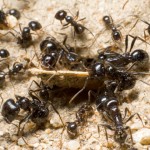
ANTS
PEST CONTROL
Ants are highly socialized and organized six-legged insects that form colonies. They are industrious and breed fast.
Ants will often travel a wide range in search for food. That is why a few ants found in the kitchen can quickly become an infestation. Some types of ant will lay down a scent which attracts other ants to a discovered food source. Their small size means they can get into almost anything from closets, pantries, cupboards and into food and food containers. Ants are known for having a particularly strong sweet tooth and are attracted to items such as fruit, sugar and honey.
This is why starting with the right type of ant control services is a critical long term solution.
Ants’ appearance differs from that of termites in a couple of different ways:
- Darker color depending on the species.
- Elbowed antennae.
- Eyes are evident on the side of the head.
- 3 sections – Head, Thorax and Gaster.
- Compared to termites, ants have a thin waist where the thorax meets the gaster.
Ants operate in a caste system:
- Worker
- All female.
- Look after the queen, care for the young, forage for food.
- Help expand and maintain the nest.
- Quite small compared to the other castes.
- Soldier
- All female.
- Only current in ant species which are polymorphic.
- Much larger than worker ants and have strong jaws.
- Protect the colony but also, use their large jaws to help cut and carry large objects.
- Soldier ants use their large head to block the entrances to their nests when under attack.
- Flying Ants/Alate
- All female.
- Their two sets of wings are different sizes from one another.
- Fly away from the nest to start a new colony. Once they have landed and start to build a nest, they clip their wings and use them as a source of protein for their new colony.
- Winged Drone
- The only male in an ant colony.
- Their only job is to reproduce.
- They fly off with the females to reproduce and start a new colony.
- Once they have mated they die.
Management
- Spot Treatment with pesticides
- Gel Baiting
- Residual Spray with chemical
- Thermal Fogging to external nest

